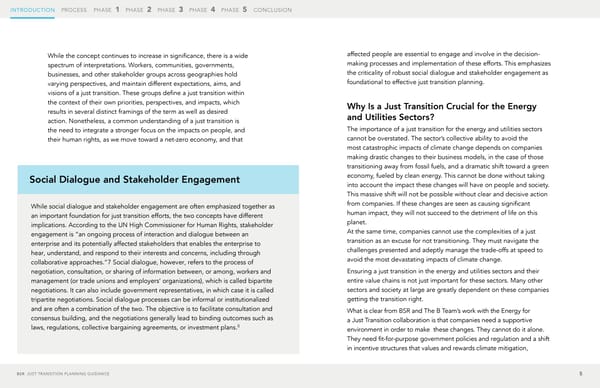INTRODUCTIONINTRODUCTION PROCESS PHASE 1 PHASE 2 PHASE 3 PHASE 4 PHASE 5 CONCLUSION affected people are essential to engage and involve in the decision- While the concept continues to increase in signi昀椀cance, there is a wide spectrum of interpretations. Workers, communities, governments, making processes and implementation of these efforts. This emphasizes businesses, and other stakeholder groups across geographies hold the criticality of robust social dialogue and stakeholder engagement as varying perspectives, and maintain different expectations, aims, and foundational to effective just transition planning. visions of a just transition. These groups de昀椀ne a just transition within the context of their own priorities, perspectives, and impacts, which Why Is a Just Transition Crucial for the Energy results in several distinct framings of the term as well as desired and Utilities Sectors? action. Nonetheless, a common understanding of a just transition is the need to integrate a stronger focus on the impacts on people, and The importance of a just transition for the energy and utilities sectors their human rights, as we move toward a net-zero economy, and that cannot be overstated. The sector’s collective ability to avoid the most catastrophic impacts of climate change depends on companies making drastic changes to their business models, in the case of those transitioning away from fossil fuels, and a dramatic shift toward a green Social Dialogue and Stakeholder Engagement economy, fueled by clean energy. This cannot be done without taking into account the impact these changes will have on people and society. This massive shift will not be possible without clear and decisive action from companies. If these changes are seen as causing significant While social dialogue and stakeholder engagement are often emphasized together as human impact, they will not succeed to the detriment of life on this an important foundation for just transition efforts, the two concepts have different planet. implications. According to the UN High Commissioner for Human Rights, stakeholder At the same time, companies cannot use the complexities of a just engagement is “an ongoing process of interaction and dialogue between an transition as an excuse for not transitioning. They must navigate the enterprise and its potentially affected stakeholders that enables the enterprise to challenges presented and adeptly manage the trade-offs at speed to hear, understand, and respond to their interests and concerns, including through avoid the most devastating impacts of climate change. collaborative approaches.”7 Social dialogue, however, refers to the process of Ensuring a just transition in the energy and utilities sectors and their negotiation, consultation, or sharing of information between, or among, workers and entire value chains is not just important for these sectors. Many other management (or trade unions and employers’ organizations), which is called bipartite sectors and society at large are greatly dependent on these companies negotiations. It can also include government representatives, in which case it is called getting the transition right. tripartite negotiations. Social dialogue processes can be informal or institutionalized and are often a combination of the two. The objective is to facilitate consultation and What is clear from BSR and The B Team’s work with the Energy for consensus building, and the negotiations generally lead to binding outcomes such as a Just Transition collaboration is that companies need a supportive 8 laws, regulations, collective bargaining agreements, or investment plans. environment in order to make these changes. They cannot do it alone. They need fit-for-purpose government policies and regulation and a shift in incentive structures that values and rewards climate mitigation, BSR JUST TRANSITION PLANNING GUIDANCE 5
 The Just Transition Planning Process for Business Page 4 Page 6
The Just Transition Planning Process for Business Page 4 Page 6